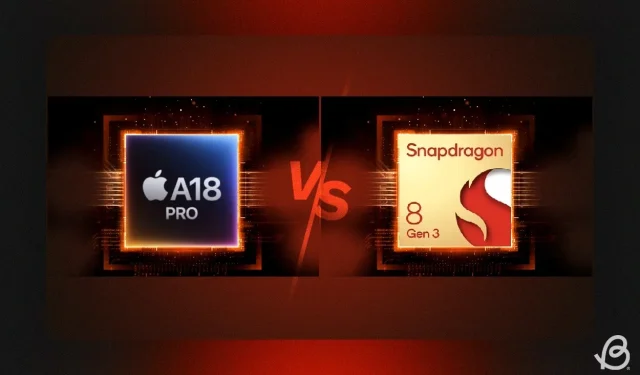
Apple has launched its new flagship smartphones, the iPhone 16 Pro and 16 Pro Max, which are powered by the impressive A18 Pro chipset. The A18 Pro chipset has been making waves for its superior performance and unmatched efficiency. But how does it compare with the Snapdragon 8 Gen 3, the top-tier chipset in the Android ecosystem? To uncover the answer, let’s dive into a comprehensive benchmark comparison between the A18 Pro and Snapdragon 8 Gen 3.
A18 Pro vs Snapdragon 8 Gen 3: Specifications
| Specifications | Apple A18 Pro | Snapdragon 8 Gen 3 |
|---|---|---|
| CPU | Six-core CPU (2+4) | Octa-core, Kryo CPU (1+3+2+2) |
| CPU Cores | 2x 4.05GHz Performance cores, 4x 2.42GHz Efficiency cores | 1x 3.3GHz (Cortex-X4), 3x 3.2GHz (Cortex-A720), 2x 3.0GHz (Cortex-A720), 2x 2.3GHz (Cortex-A520) |
| Process Technology | TSMC’s 3nm process (N3E) | TSMC’s 4nm process (N4P) |
| GPU | Apple 6-core GPU with hardware-accelerated Ray Tracing | Adreno GPU 750 with HW Ray Tracing, AFME 2.0, Unreal Engine 5 Lumen |
| Memory Support | LPDDR5X, up to 7500 MT/s | LPDDR5X, up to 4.8GHz |
| Machine Learning and AI | 16-core Neural Engine; 35 TOPS | New Hexagon AI Engine; supports AI models up to 10B parameters |
| Modem | Snapdragon X75 5G modem, up to 10 Gbps Peak Download, up to 3.5 Gbps Peak Upload | Snapdragon X75 5G modem, up to 10 Gbps Peak Download, up to 3.5 Gbps Peak Upload |
| Connectivity | Wi-Fi 7, Bluetooth 5.3 | Wi-Fi 7, Bluetooth 5.4, LE |
A18 Pro vs Snapdragon 8 Gen 3: Geekbench 6 CPU
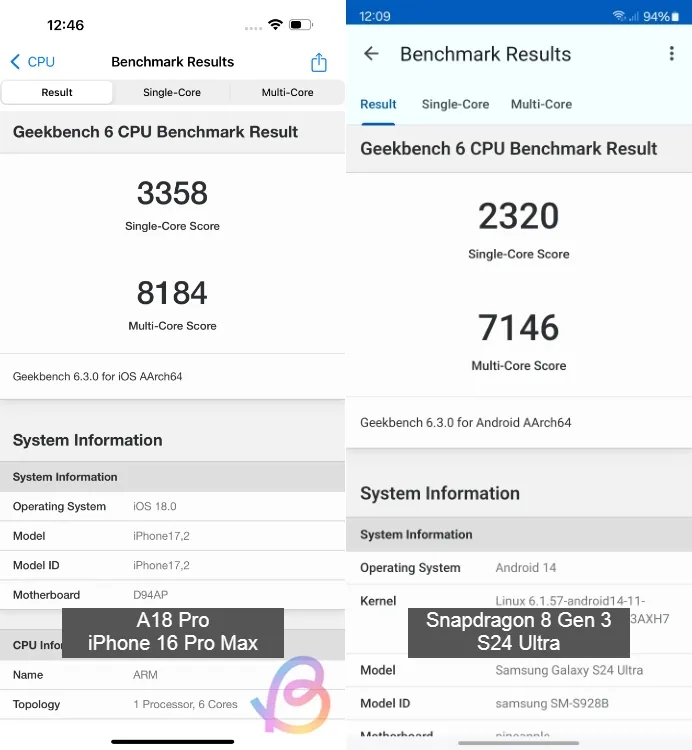
In the Geekbench CPU test, the A18 Pro achieved scores of 3,358 in single-core performance and 8,184 in multi-core tasks. The A18 Pro CPU utilizes the Armv9.2a architecture and features two new SME units (Machine Learning accelerators), giving it a slight advantage in the latest Geekbench 6.3 benchmark which supports SME.
On the other hand, the previous generation Snapdragon 8 Gen 3 recorded scores of 2,320 in single-core and 7,146 in multi-threaded tasks. The Snapdragon 8 Gen 3 is built on the older Armv8 architecture and does not support SME.
In summary, the A18 Pro outperforms the Snapdragon 8 Gen 3 by about 45% in single-core tasks and 14% in multi-core performance. Given that the Snapdragon 8 Gen 3 features eight CPU cores compared to the A18 Pro’s six, the difference in multi-core performance is not extremely pronounced.
A18 Pro vs Snapdragon 8 Gen 3: AnTuTu Benchmark
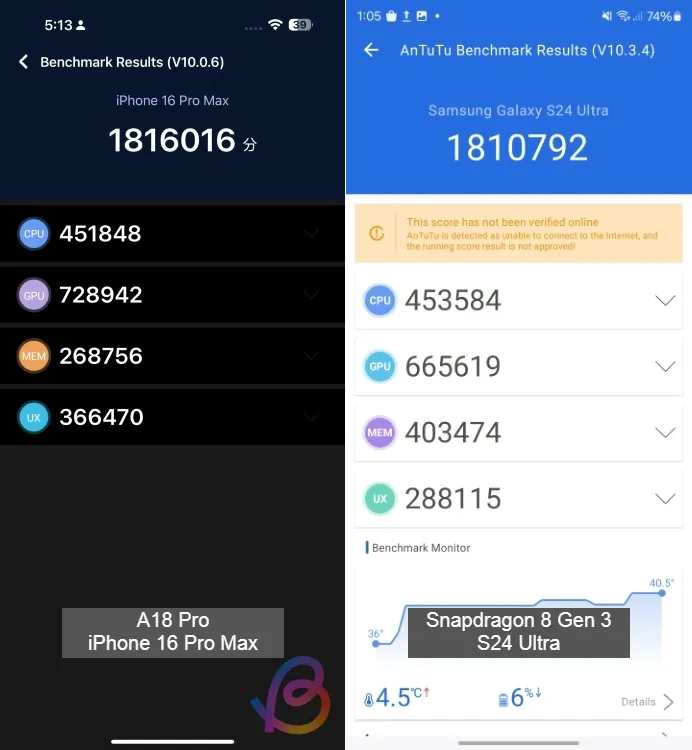
In the AnTuTu benchmark, both the A18 Pro and Snapdragon 8 Gen 3 deliver comparable results. The A18 Pro scored 1,826,016 points, whereas the Snapdragon 8 Gen 3 reached 1,810,792 points. While CPU performance is nearly equivalent, the A18 Pro showcases an impressive 10% better graphics performance in the GPU department.
| AnTuTu Benchmark | A18 Pro | Snapdragon 8 Gen 3 |
|---|---|---|
| AnTuTu Score | 1,816,016 | 1,810,792 |
| CPU | 451,848 | 453,584 |
| GPU | 728,942 | 665,619 |
| Memory | 268,756 | 403,474 |
| UX | 366,470 | 288,115 |
A18 Pro vs Snapdragon 8 Gen 3: 3DMark Wild Life Extreme Stress Test
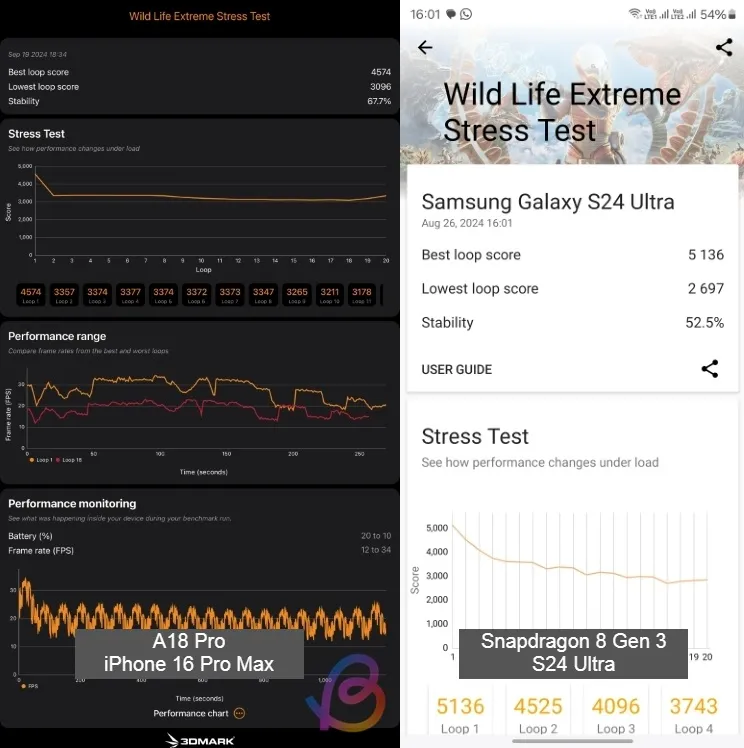
Next, in our 3DMark Wild Life Extreme Stress test, the 6-core A18 Pro GPU achieved a best loop score of 4,574 points and a lowest loop score of 3,096 points, with a stability of 67.7%. Conversely, the Adreno 750 GPU on the Snapdragon 8 Gen 3 scored higher in the initial loop with 5,136 points. However, after several rounds, its lowest score dropped to 2,697 points, indicating a stability of only 52.5%.
This indicates that while the Snapdragon 8 Gen 3 may initially boost GPU performance, it struggles to maintain peak performance over time. The A18 Pro, in contrast, provides a more stable gaming experience over extended periods, making it a superior choice for gaming.
| 3DMark Wild Life Extreme Stress Test | A18 Pro | Snapdragon 8 Gen 3 |
|---|---|---|
| Best loop score | 4,574 | 5,136 |
| Lowest loop score | 3,096 | 2,697 |
| Stability | 67.7% | 52.5% |
A18 Pro vs Snapdragon 8 Gen 3: Geekbench AI
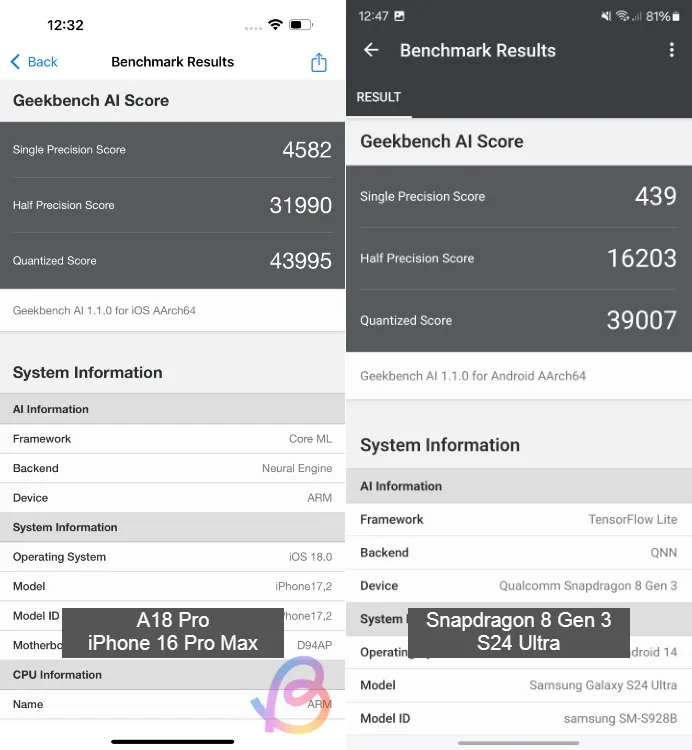
Finally, we come to the Geekbench AI test that measures the performance of the Neural Engine/NPU. The latest update for Geekbench AI, version 1.1, has improved scores across the board and added support for TensorFlow Lite and the QNN framework for Android devices, allowing for a clearer comparison between Android and iOS devices.
In our tests, the A18 Pro significantly outperformed the Snapdragon 8 Gen 3 in Single Precision (FP32) with a score of 4,582 compared to only 439 for the Snapdragon. The full precision format is more accurate for AI/ML tasks, albeit more memory-intensive.
In Half Precision (FP16), the 16-core A18 Pro Neural Engine delivers twice the performance of the Hexagon AI engine found in the Snapdragon 8 Gen 3. Finally, in Quantized format (INT8) — which is more memory-efficient but slightly less accurate — the A18 Pro is approximately 13% faster than the Snapdragon 8 Gen 3.
It is evident that Apple leads the charge in on-device AI computation. Additionally, with the new SME units integrated into the CPU, the A18 Pro clearly stands out as the superior chipset for executing AI/ML features locally.
| Geekbench AI | A18 Pro | Snapdragon 8 Gen 3 |
|---|---|---|
| Single Precision Score | 4,582 | 439 |
| Half Precision Score | 31,990 | 16,203 |
| Quantized Score | 43,995 | 39,007 |
The Verdict
It’s clear that the A18 Pro outshines the Snapdragon 8 Gen 3 in every aspect, whether it’s CPU, GPU, or Neural Engine/NPU performance. Apple has engineered the most powerful and efficient CPU cores, and its GPU consistently delivers robust performance. Furthermore, in on-device AI processing tasks, Apple has reaffirmed its position as the industry’s leader.
Looking ahead, anticipation builds for the upcoming Snapdragon 8 Gen 4 which promises groundbreaking performance. Early leaks suggest Qualcomm may soon surpass Apple in CPU capabilities for the first time. The Snapdragon 8 Gen 4 is set to be unveiled at the forthcoming Snapdragon Summit event next month.




Leave a Reply